Cairo
- The Egyptians are facing a new crisis in the rise in food prices these days, especially red and white meat, but all of them were overshadowed by the prices of eggs, whose price has jumped dramatically, if not doubled in a short period of time.
During the past few days, the prices of a carton of eggs jumped in an unprecedented way in the local market, and its price exceeded 60 pounds (a dollar equals 15.70 pounds) compared to 30 pounds a few months ago, amid the confusion and astonishment of Egyptian families from these crazy increases.
Eggs are one of the components of Egyptian snacks (sandwiches) for millions of schoolchildren due to their nutritional value and price, which is often within everyone's reach, but these days the price of one egg has reached two pounds, and a carton contains 30 eggs.
With the unusually high price of eggs, some also launched an unprecedented campaign on social media to boycott the purchase of eggs under the hashtag “free-hatches” for 10 days until its price drops after the increase in supply.
In March 2019, Egyptian President Abdel Fattah al-Sisi responded to the Egyptians' complaints about the high prices, and called for confronting the high prices by boycotting products and goods that are overpriced, saying, "Listen... do you want to control prices, things that have a high price do not buy? The matter is simple."
Comments on the media regarding the rise in egg prices this time were mixed with a lot of sarcasm and sarcasm over this high price that hit even eggs, which are a natural and popular food ingredient.
Reasons for the high price of eggs
There were many reasons for the increase in the price of eggs, as egg producers and traders attributed the increase in the price to the increase in the costs of production inputs such as feed, medicine, gas, electricity and vaccines for chickens, and the decline in local production in conjunction with the increase in demand due to the start of the school season.
The head of the Poultry Division, Abdul Aziz Al-Sayed, attributed the rise in prices to the closure of some farms during the past year due to the losses incurred by producers and the lack of supply. He said in press statements that many egg producers incurred significant losses as a result of the decline in prices and the increase in production, which led some to stop their activities.
Some local newspapers quoted a number of traders as saying that "the increase in the prices of poultry feed and vaccines was behind the recent increase in the cost of production, whether with regard to poultry or eggs."
On the possibility of prices falling again, they indicated that this depends on the increase in production in the coming days, especially since there are expectations of an increase in demand with the advent of the winter season.
The poultry sector is one of the strategic sectors in Egypt, which achieves self-sufficiency in eggs and white meat and absorbs about 4 million job opportunities and more than 100 billion pounds in investments, according to statements by the Minister of Agriculture.
Egypt used to produce about 1.6 billion chickens annually, and its annual production of eggs rose to 13 billion eggs, and the per capita share of about 130 eggs annually based on the latest statistics, according to the head of the Poultry Wealth Division.
The Egyptian media, Amr Adib, entered the crisis line, and he said through his program on one of the satellite channels that last Ramadan the Egyptians used a lot of eggs because of suhoor and the preparation of cakes and biscuits, and their price at the time was 26 pounds, now with the start of the school season its price exceeds 52 pounds.
He added, "I am not talking here about baladi eggs, which are more expensive than the normal white and brown eggs sold in the markets, which have now become valuables." He wondered: Why did the prices of eggs rise with the start of the school season?
Considering that something is wrong.

